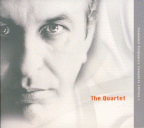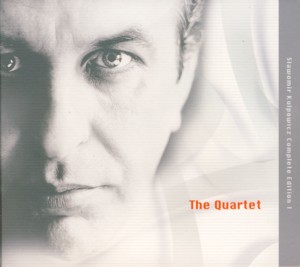Record Reviews
1 Review Found. Use search to find more reviews or follow the links in the review text.
  | QUARTET ~ THE QUARTET
POLSKIE RADIO 1246-1247 (Barcode: 5907812242466) ~ POLAND ~ Jazz
Recorded: 1977 - 1979 Released: 2013
This is the first installment in a series of releases documenting the recorded legacy of the great Polish Jazz pianist / composer Slawomir KulpowiczFind albums by this artist, most of which is released for the first time. Kulpowicz, who died prematurely in 2008 at the age of 56, was a victim of cancer. He was a member of groups led by the top Polish Jazz players like Zbigniew NamyslowskiFind albums by this artist and Tomasz StankoFind albums by this artist and led / co-led his own ensembles like The QuartetFind albums by this artist, In-FormationFind albums by this artist and also cooperated with many other musicians over the years. He was an avid follower of John ColtraneFind albums by this artist´s music and kept in touch with Coltrane´s wife Alice ColtraneFind albums by this artist. Following his visit to India, Kulpowicz discovered Indian music and the spiritual aura of India, which became his own.
The Quartet was formed by the rhythm section of Zbigniew Namyslowski´s so called "third quartet", i.e. pianist Slawomir Kulpowicz, bassist Pawel JarzebskiFind albums by this artist and drummer Janusz StefanskiFind albums by this artist, with the addition of saxophonist Tomasz SzukalskiFind albums by this artist, one of Poland´s all-time greatest Jazz musicians and a spectacular player of rare quality. Although Szukalski naturally dominated the sound of the ensemble, it was Kulpowicz who was the spiritual leader and the sole composer of all the original material they performed. Spiritually the music was soaked in the John Coltrane legacy, with Szukalski playing lengthy "wall of sound" solos, supported passionately by the rhythm section, with Kulpowicz vamping a la McCoy TynerFind albums by this artist, Jarzebski delivering virtuosic bass parts and Stefanski raising all hell behind it all, which engulfed the overall effect with incredible power and overwhelming strength of expression, similar in character to the Coltrane late period recordings.
In spite of the fact that The Quartet was undoubtedly the most important Polish Jazz ensemble in the late 1970s, their recorded legacy is truly pitiful and includes one live album recorded in 1978 and released by the PoljazzFind albums on this label label (reissued by the AnexFind albums on this label label) and their sole studio album, recorded in Finland in 1979 and released by the tiny independent Finnish label LeoFind albums on this label Records (which released also two albums by Tomasz Stanko from the same period). Therefore this double CD full of superb radio and concert recordings by The Quartet is an absolute marvel and a must have for every Polish / European Jazz connoisseur.
Following the ensemble´s breakdown in mid-1980, the Polish Jazz scene will never again experience this kind of music, so close in spirit, sound and emotion to the epicenter of Modern Jazz created by Coltrane. The Quartet´s brief three and a half years period was the closest ever moment in which Polish Jazz would become very close to American Jazz of a decade earlier, both in spirit and in practice. The Quartet somehow managed to put aside the omnipresent Polish melancholy and lyricism, which dictates most of the unique music created under the Polish Jazz banner. Usually, when Polish Jazz musicians try to imitate their idols from across the pond, they fail rather miserably, with The Quartet being the only exception, which proves the rule.
Young Polish Jazz musicians should study this music note by note – this is universally sublime document of human expression, freedom and power of creation, which happens rarely. Inspired by Coltrane´s music, this creation sparks a life of its own, which stands shoulder to shoulder with the original, without any inferiority complexes whatsoever. It is not a copy of the source; it is a thankful gratitude for the inspiration itself.
Bringing this music out of the vaults is commendable, although keeping it in the vaults for so long was simply criminal. Such treasures of the Polish Cultural heritage should be exposed in all their glory. Hopefully the people in charge of the Polish Radio archives realize that.
| | | CD 2 Digipak Remastered Recommend To A Friend |
|







